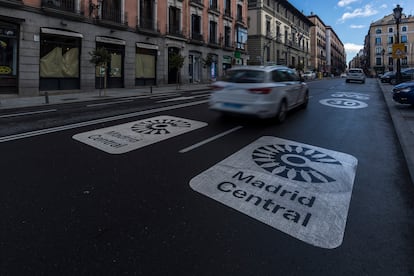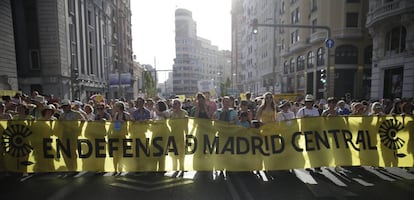Supreme Court ruling leaves Madrid Central low-emission scheme hanging in the balance
Spain’s top judges have struck down an appeal to save the anti-pollution plan, which the current mayor wants to replace with a new system. Until then, it is unclear whether fines will continue to be enforced

The future of the low-emission zone known as Madrid Central is hanging in the balance. The scheme, introduced by a former mayor of Madrid, Manuela Carmena of the leftist Más Madrid party, made 472 hectares of the city center off-limits to traffic, except for local residents and public transportation. Thanks to the initiative, greenhouse gas emissions fell to 10-year lows in the city center.
But it is unclear what will happen now that the Supreme Court has struck down an appeal by the environmental group Ecologists in Action. The activists had challenged a ruling from the Madrid High Court, which canceled the low-emissions zone over legal technicalities in July 2020.
In that case, the court ruled that local legislation establishing the traffic restrictions in October 2018 was approved without a proper public disclosure process or an economic impact report. The ruling was the result of two appeals filed by the conservative Popular Party (PP) while it was in the opposition, as well as a third appeal by a company that helps people fight traffic fines, DVuelta Asistencia Legal.
The PP, which has been a staunch opponent of Madrid Central since its inception at the end of 2018, argued that the €11.7-million price tag to carry out the plan for a seven-year period jeopardized the city’s financial stability.

But in a press release issued on Tuesday, Ecologists in Action pointed out that the “budgetary repercussions [of Madrid Central] were minute in comparison to the annual municipal budget which exceeds €5 billion.” The group said the fact that the low-emissions zone “has greatly helped improve air quality in the capital is apparently not important enough” to the Supreme Court.
The environmental group must now decide whether it will appeal Tuesday’s ruling at the Constitutional Court, which is the last legal route to save Madrid Central. “They have sentenced us to pay €1,000 in legal costs and we are awaiting the decision in five other appeals that we have pending,” said Paco Segura, coordinator of Ecologists in Action. “If they sentence us to pay [in all five appeals] we will be left totally defenseless.” The group also argued it was very unlikely for the Constitutional Court to reach a different ruling from the Supreme Court.
What does the ruling mean for Madrid Central?
The question now is whether vehicles will be fined for violating the low-emissions zone. Madrid Mayor José Luis Martínez-Almeida, of the PP, said on Tuesday that “until the [Supreme Court] sentence is final, Madrid Central remains in force.” He said that fines will continue to be issued to violators and surveillance cameras will remain in action. He did not, however, specify when the ruling would be considered final.
The deputy mayor of Madrid, Begoña Villacís, from the center-right Ciudadanos (Citizens) – which governs Madrid in coalition with the PP – added that Madrileños should “act as if Madrid Central still existed.”
But the experts disagree. According to Jaime Doreste, a lawyer for Ecologists in Action, it is “very likely” that any fines that are appealed following the Supreme Court ruling will not have to be paid. In principle, this means that the most polluting cars will be able to enter Madrid Central without any repercussions.
Ángeles Miguel, the legal head of the insurance company RACE, said that all fines issued after July 27, 2020, when the Madrid High Court struck down Madrid Central are null and void. “At that moment, the ruling was issued and now it has been ratified. All the sanctions from then on are null and the ones before are questionable.”
Pedro Javaloyes, the spokesperson of DVuelta Asistencia Legal, went even further. He argued that not only traffic tickets issued following the ruling can be appealed, but every traffic ticket that has been issued up until now. According to Javaloyes, the Supreme Court ruling means the “automatic end of Madrid Central.”
Madrileños should act as if Madrid Central still existedBegoña Villacís, deputy mayor of Madrid
According to municipal sources, 1,393,000 traffic tickets have been issued, worth the equivalent of €125 million. A spokesperson from the local government said that traffic tickets that have been paid or issued will not be refunded.
Madrid City Hall has two months to adhere to the Supreme Court’s decision. This has put pressure on the local government to speed up the introduction of its own anti-pollution plan, Madrid 360, which is set to replace Madrid Central. This initiative, announced by Martínez-Almeida in 2019, will ease traffic restrictions in the low-emissions zone, reduce parking fees and give more parking space to motorcycles. According to municipal sources, the new mobility law is expected to be ready by July.
In the meantime, Martínez-Almeida is trying to prevent the center of Madrid from becoming a legal black hole. While the mayor has insisted that Madrid Central remains in force, legally all traffic tickets can be appealed. In a bid to reduce traffic to the center, the local government is also considering turning over some roads in the low-emission zone to pedestrians, as is done during Christmas.
Martínez-Almeida insisted on Tuesday that Madrid Central “neither solved the air quality problems in Madrid nor followed the law,” despite the fact that the initiative saw nitrogen dioxide emissions fall to historic lows.
A long battle
Madrid Central was the signature issue of the leftist administration headed by Carmena, and it was heavily criticized by the PP despite the fact that the concept built on an earlier idea for a no-traffic zone developed in 2014 by then-mayor Ana Botella of the PP. The conservatives at one point compared Madrid Central with the Warsaw Ghetto and the Berlin Wall.
But the project was instrumental in sparing Spain legal action by the European Commission before the EU Court of Justice in 2018. At that point, the Spanish capital had been exceeding European pollution thresholds for nearly a decade and was facing a multimillion-euro fine.
According to a report by the European federation of environmental associations, transportation and environment (T&E) emissions of nitrogen dioxide at one point fell 32% thanks to the initiative. This figure, however, is taken from the only measuring station within the low-emissions zone.
In July 2019, the newly elected mayor, Martínez-Almeida, attempted to introduce a moratorium on sanctions but he was stopped by the courts, which cited the need “to preserve public health and the environment.”
According to Ecologists in Action, the PP’s persistence in the courts is less to do with Madrid Central and more to do with dismantling the legacy of former mayor Carmena.
“What all this process shows is the poorly concealed effort of the Martínez-Almeida government to get rid of one the emblems of the former administration, Madrid Central, despite it being a measure that is greatly valued by Madrileños and called for by more neighborhoods in the city,” the group said in the press release. “The attempts to dismantle it have been stopped by the courts, something that has only changed now with very questionable interpretations of the law.”
English version by Melissa Kitson.
Tu suscripción se está usando en otro dispositivo
¿Quieres añadir otro usuario a tu suscripción?
Si continúas leyendo en este dispositivo, no se podrá leer en el otro.
FlechaTu suscripción se está usando en otro dispositivo y solo puedes acceder a EL PAÍS desde un dispositivo a la vez.
Si quieres compartir tu cuenta, cambia tu suscripción a la modalidad Premium, así podrás añadir otro usuario. Cada uno accederá con su propia cuenta de email, lo que os permitirá personalizar vuestra experiencia en EL PAÍS.
¿Tienes una suscripción de empresa? Accede aquí para contratar más cuentas.
En el caso de no saber quién está usando tu cuenta, te recomendamos cambiar tu contraseña aquí.
Si decides continuar compartiendo tu cuenta, este mensaje se mostrará en tu dispositivo y en el de la otra persona que está usando tu cuenta de forma indefinida, afectando a tu experiencia de lectura. Puedes consultar aquí los términos y condiciones de la suscripción digital.








































